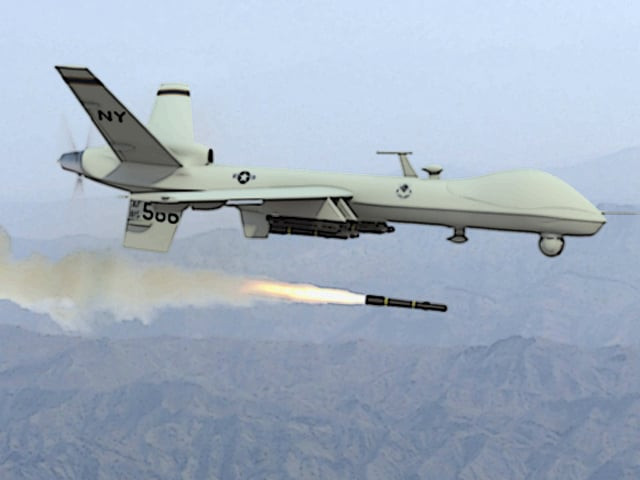Droning the truth
It is necessary to protest every time a drone attack is carried out, especially focusing on the collateral damage

If we endorse these attacks because they kill our enemies, we would only be according them a legal status in international law, conferring moral justification to the attacks and conceding to the US or any other country the right to undermine our sovereignty. PHOTO: AFP
It may also be recalled that Prime Minister Nawaz Sharif in his address to the UN General Assembly on September 27, 2013 had said that the use of armed drones in the border areas of Pakistan were a continued violation of Pakistan’s territorial integrity and also stressed that they result in casualties of innocent civilians and are detrimental to efforts to eliminate extremism and terrorism. On the other hand, one of Pakistan’s major opposition parties, the PTI, which rules the province of Khyber-Pakhtunkhwa (K-P), had disrupted Nato supplies to Afghanistan for almost three months by blocking its route and protesting against drone attacks. The blockade ended on February 27, 2014 after a court held it illegal.
Paradoxically, however, the drones do kill our enemies — the terrorists who are waging war against Pakistan. But then, if we endorse these attacks because they kill our enemies, we would only be according them a legal status in international law, conferring moral justification to the attacks and conceding to the US or any other country the right to undermine our sovereignty any time that suits them. Maintaining official silence at such attacks would also have the same effect. So, it is necessary to protest every time a drone attack is carried out, especially focusing on the collateral damage which involves the lives of innocent bystanders while leaving the counting of the enemy dead to the CIA. We should also be demanding compensation from the US for collateral damages or pay the bereaved families from the Coalition Support Fund.
The foreign media maintains that the recent drone attacks by the US have raised speculation that Washington and Islamabad are coordinating their military efforts. There has never been an official confirmation of these media claims by either the US or the Pakistani military. However, former president General (retd) Pervez Musharraf, in an interview to the CNN in October 2013, confirmed in a roundabout way that the authorisation was given “just on a few events, when a target was absolutely isolated and no chance of collateral damage. We talked over the drone attacks operations at the military and intelligence level and cleared only if there was no time for our own (special operations undertaking force) and military to act.” But he had left a gaping hole in the two conditions under which he allowed the attacks for the CIA to fly in its drones through as frequently as it felt in its judgment that the target was out of the Pakistan Army’s reach. Even the decision that there was “no chance of collateral damage” was seemingly left to the judgment of the CIA. And above all, you do not enter the skies of other countries, even the friendliest ones, without first informing the relevant authorities in those countries, especially when you are sending in armed drones.
Clearly for justifiable reasons, it seems the civilian government in Islamabad was not kept in the drone attack loop. And that has allowed our successive civilian administrations to resort to what is called plausible deniability. Since they have been deliberately made unaware that a tacit understanding exists on the drone issue at the US-Pakistan intelligence levels, the civilian administration is shielded from any responsibility associated through the knowledge of any possible understanding between the two militaries. So, while the CIA continues to send in its armed drones with tacit permission from our premier intelligence agencies, our civilian administrations are morally and ethically free to continue to condemn the attacks.
Published in The Express Tribune, February 1st, 2015.
Like Opinion & Editorial on Facebook, follow @ETOpEd on Twitter to receive all updates on all our daily pieces.















COMMENTS
Comments are moderated and generally will be posted if they are on-topic and not abusive.
For more information, please see our Comments FAQ